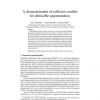Free Online Productivity Tools
i2Speak
i2Symbol
i2OCR
iTex2Img
iWeb2Print
iWeb2Shot
i2Type
iPdf2Split
iPdf2Merge
i2Bopomofo
i2Arabic
i2Style
i2Image
i2PDF
iLatex2Rtf
Sci2ools
139
click to vote
COMMA
2010
2010
A characterization of collective conflict for defeasible argumentation
In this paper we define a recursive semantics for warrant in a general defeasible argumentation framework by formalizing a notion of collective (non-binary) conflict among arguments. This allows us to ensure direct and indirect consistency (in the sense of Caminada and Amgoud) without distinguishing between direct and indirect conflicts. Then, the general defeasible argumentation framework is extended by allowing to attach levels of preference to defeasible knowledge items and by providing a level-wise definition of warranted and blocked conclusions. Finally, we formalize the warrant recursive semantics for the particular framework of Possibilistic Defeasible Logic Programming, characterize the unique output program property and design an efficient algorithm for computing warranted conclusions in polynomial space. Keywords. Defeasible argumentation, collective conflict, recursive warrant semantics.
Applied Computing | COMMA 2010 | Defeasible Argumentation | Defeasible Argumentation Framework | General Defeasible Argumentation |
| Added | 14 May 2011 |
| Updated | 14 May 2011 |
| Type | Journal |
| Year | 2010 |
| Where | COMMA |
| Authors | Teresa Alsinet, Ramón Béjar, Lluis Godo |
Comments (0)

